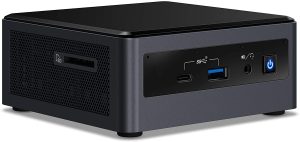Intel NUC 10 Performance kit User Guide
Intel NUC 10 Performance kit User Guide
Before You Begin

The steps in this guide assume you’re familiar with computer terminology and with the safety practices and regulatory compliance required for using and modifying computer equipment.
Disconnect the computer from its power source and from any network before performing any of the steps described in this guide.
Failure to disconnect power, telecommunications links, or networks before you open the computer or perform any procedures can result in personal injury or equipment damage. Some circuitry on the board can continue to operate even though the front panel power button is off.
Follow these guidelines before you begin:
- Always follow the steps in each procedure in the correct order.
- Create a log to record information about your computer, such as model, serial numbers, installed options, and configuration information.
- Electrostatic discharge (ESD) can damage components. Perform the procedures described in this chapter only at an ESD workstation using an antistatic wrist strap and a conductive foam pad. If such a station isn’t available, you can provide some ESD protection by wearing an antistatic wrist strap and attaching it to a metal part of the computer chassis.
Installation Precautions
When you install and test the Intel NUC, observe all warnings and cautions in the installation instructions.
To avoid injury, be careful of:
- Sharp pins on connectors
- Sharp pins on circuit boards
- Rough edges and sharp corners on the chassis
- Hot components (such as SSDs, processors, voltage regulators, and heat sinks)
- Damage to wires that could cause a short circuit
Observe all warnings and cautions that instruct you to refer computer servicing to qualified technical personnel.
Observe Safety and Regulatory Requirements
If you don’t follow these instructions, you increase your safety risk and the possibility of noncompliance with regional laws and regulations.
This guide tells you how to:
- Install and remove memory
- Install an M.2 SSD
- Install a 2.5” drive
- Install a VESA mount bracket
- Connect power
- Install an operating system
- Install the latest drivers
Open the Chassis
To open the Intel NUC chassis, follow these steps:
- Unscrew the four corner screws on the bottom cover of the chassis and lift the cover.
Installing and Removing Memory
Intel NUC Kits NUC10i7FNH, NUC10i5FNH, and NUC10i3FNH have two 260-pin DDR4 SO-DIMM sockets.
Be sure to select memory modules that meet these requirements:
- 1.2V low voltage memory
- 2666 MHz SO-DIMMs
- Non-ECC
Find compatible memory modules in the Intel Product Compatibility Tool
NOTE If you plan to install only one memory module, install it in the lower memory socket.
To install memory, follow these steps:
- Observe the precautions in “Before You Begin” on page 2.
- Turn off all peripheral devices connected to the computer. Turn off the computer and disconnect the power cord.
- Remove the computer’s bottom chassis cover.
- Align the small space at the bottom edge of the memory module with the key in the socket.
- Insert the bottom edge of the module at a 45-degree angle into the socket (A).
- When the module is inserted, push down on the outer edge of module until the retaining clips snap into place (B). Make sure the clips are firmly in place (C).
To remove a SO-DIMM, follow these steps:
- Observe the precautions in “Before You Begin” on page 2.
- Turn off all peripheral devices connected to the computer. Turn off the computer and disconnect the power cord.
- Remove the computer’s bottom chassis cover.
- Gently spread the retaining clips at each end of the memory socket, which causes the module to pop out of the socket (C).
- Holding the module by the edges, lift it away from the socket, and store it in an anti-static package.
- Reinstall and reconnect any parts you removed or disconnected to reach the memory sockets.
- Replace the computer’s cover and reconnect the power cord.
Install an M.2 SSD or Intel® Optane™ Memory Module
The Intel NUC Kits NUC10i7FNH, NUC10i5FNH, and NUC10i3FNH support an 80mm or 42mm SSD.
Find compatible M.2 SSDs in the Intel Product Compatibility Tool
NOTE Before changing the Intel Optane memory module, it needs to be disabled. Follow Removing Intel Optane Memory on this page first, before taking the module out.
If you’re installing an 80mm M.2 SSD:
- Remove the small silver screw from the 80mm (A) and 42mm (B) metal standoff on the motherboard.
- Align the small notch at the bottom edge of the M.2 card with the key in the connector.
- Insert the bottom edge of the M.2 card into the connector (C).
- Secure the card to the standoff with the small silver screw (D).
If you’re installing a 42mm M.2 SSD:
- Remove the small silver screw from the metal standoff on the motherboard (A).
- Align the small notch at the bottom edge of the M.2 card with the key in the connector.
- Insert the bottom edge of the M.2 card into the connector (B).
- Secure the card to the standoff with the small silver screw (C).
Install a 2.5” SSD or Hard Drive
The Intel NUC Kits NUC10i7FNH, NUC10i5FNH, and NUC10i3FNH support an additional 2.5” Solid State Drive (SSD) or Hard Disk Drive (HDD).
Find compatible 2.5” drives in the Intel Product Compatibility Tool:
- Slide the new 2.5” drive into the drive bay, ensuring the SATA connectors are fully seated into the connectors of the SATA daughter card (A).
- Secure the drive into the drive bay with the two smallest black screws that were included in the box (B). Set the drive bay bracket down inside the chassis (C).
Close the Chassis
After all components have been installed, close the Intel NUC chassis. Intel recommends this be done by hand with a screwdriver to avoid over-tightening and possibly damaging the screws.
Attach and Use the VESA Bracket (Optional)
Follow these instructions to attach and use the VESA mount bracket:
- Using the four small black screws that were included in the box, attach the VESA bracket to the back of the monitor or TV.
- Attach the two slightly larger black screws to the bottom chassis cover of the Intel NUC.
- Slide the Intel NUC onto the VESA mount bracket.
Connect Power
Country-specific power cords are included in the Intel NUC Kit box.
Connect AC power
Each Intel NUC model includes either a region-specific AC power cord or no AC power cord (only the power adapter).
Product codes |
Power cord type |
BXNUC10i7FNH, BXNUC10i7FNHJA, BXNUC10i5FNH BXNUC10i5FNHJ, BXNUC10i5FNHJA, BXNUC10i3FNH, BXNUC10i3FNHFA, |
No power cord included. An AC power cord needs to be purchased separately. Power cords are available at many Internet sites for use in multiple countries. The connector on the power adapter is a C5 type connector. |
BXNUC10i7FNH1, BXNUC10i7FNHAA1, BXNUC10i7FNHJA1 BXNUC10i5FNH1, BXNUC10i5FNHJA1 BXNUC10i5FNHCA1, BXNUC10i3FNH1 BXNUC10i3FNHCA1, |
US power cord included. |
BXNUC10i7FNH2, BXNUC10i7FNHJA2, BXNUC10i5FNH2, BXNUC10i5FNHJA2 BXNUC10i3FNH2 |
EU power cord included. |
BXNUC10i7FNH3, BXNUC10i7FNHJA3, BXNUC10i5FNH3 BXNUC10i5FNHJA3, BXNUC10i3FNH3, |
UK power cord included. |
| BXNUC10i7FNH4, BXNUC10i7FNHJA4, BXNUC10i5FNH4 BXNUC10i5FNHJA4, BXNUC10i3FNH4 BXNUC10i3FNHFA4, |
Australia/New Zealand power cord included. |
BXNUC10i7FNH6, BXNUC10i7FNHC6, BXNUC10i5FNH6, BXNUC10i5FNHF6, BXNUC10i3FNH6, |
China power cord included |
Install an Operating System
Refer to Supported Operating Systems for a list of Intel-validated Windows* operating systems and versions of Linux that have been reported as compatible by Intel NUC owners.
Refer to Operating System Installation for system requirements and installation steps.
Install Intel NUC Drivers
To download the latest Microsoft* Windows* drivers and BIOS updates, use the Intel® Driver & Support Assistant (Intel® DSA) or go to Download Center:
Drivers are available for the following features:
- Chipset
- Graphics
- Intel® Management Engine
- Wireless and/or Gigabit Ethernet (depending on how you connect)
- Bluetooth®—required if you use Bluetooth devices
- Audio—required if you use the 3.5mm audio jack
- Thunderbolt
- Consumer Infrared (CIR)—required if you use an infrared remote control
- Card Reader—required if you use an SD card for extra storage
- Intel® Rapid Storage Technology—required if you plan to configure RAID